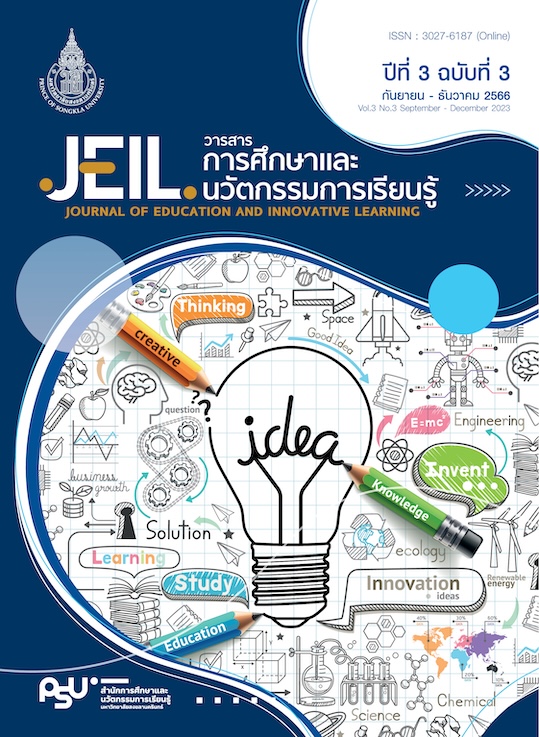การพัฒนาหลักสูตรฝึกอบรมการเรียนรู้โดยใช้วิจัยเป็นฐาน เพื่อปรับกระบวนทัศน์การคิดวิเคราะห์ของครูวิทยาลัยเทคนิคพนมสารคาม จังหวัดฉะเชิงเทรา
Main Article Content
บทคัดย่อ
วัตถุประสงค์การวิจัยเพื่อ 1) พัฒนาและหาประสิทธิภาพของหลักสูตรฝึกอบรม 2) ประเมินผลการใช้หลักสูตรฝึกอบรม กลุ่มเป้าหมาย คือ ครูวิทยาลัยเทคนิคพนมสารคาม จำนวน 48 คน เครื่องมือในการวิจัย 1) หลักสูตรฝึกอบรม 2) แบบสอบถาม 3) แบบทดสอบก่อนและหลังอบรม 4) แบบประเมินตนเอง 5) แบบประเมินความคิดเห็น 6) แบบประเมินพฤติกรรม 7) แบบประเมินทักษะการคิดวิเคราะห์ วิเคราะห์ข้อมูลโดยใช้ ค่าร้อยละ ค่าเฉลี่ย ส่วนเบี่ยงเบนมาตรฐาน ทดสอบค่าที ผลการวิจัยพบว่า สภาพปัจจุบันของการฝึกอบรมโดยใช้วิจัยเป็นฐานในภาพรวมอยู่ในระดับปานกลาง และความต้องการฝึกอบรม ภาพรวมอยู่ในระดับมาก ประสิทธิภาพของหลักสูตรฝึกอบรม ทดลองครั้งที่ 1 ประสิทธิภาพ 82.67/82.23 ทดลองครั้งที่ 2 ประสิทธิภาพ 81.78/82.97 สูงกว่าเกณฑ์ 80/80 สำหรับการประเมินผลการใช้หลักสูตรฝึกอบรมพบว่า ผลการทดสอบก่อนและหลังฝึกอบรมแตกต่างกันอย่างมีนัยสำคัญทางสถิติที่ระดับ .01 ผลการประเมินการเรียนรู้ของตนเอง ภาพรวมอยู่ในระดับมากที่สุด ผลการประเมินความคิดเห็นต่อหลักสูตรฝึกอบรม ภาพรวมอยู่ในระดับมากที่สุด ผลการประเมินพฤติกรรม ภาพรวมอยู่ในระดับมากที่สุด และผลการประเมินทักษะการคิดวิเคราะห์ ภาพรวมระดับดีมาก
Article Details

อนุญาตภายใต้เงื่อนไข Creative Commons Attribution-NonCommercial-NoDerivatives 4.0 International License.
เนื้อหาและข้อมูลในบทความที่ตีพิมพ์ในวารสารการศึกษาและนวัตกรรมการเรียนรู้ ถือเป็นข้อคิดเห็นและความรับผิดชอบของผู้เขียน ซึ่งกองบรรณาธิการวารสาร ไม่จำเป็นต้องเห็นด้วยหรือร่วมรับผิดชอบใด ๆ และไม่สงวนสิทธิ์การคัดลอกบทความเพื่อใช้ประโยชน์ทางวิชาการ แต่ให้อ้างอิงข้อมูลแสดงที่มาของบทความทุกครั้งที่นำไปใช้ประโยชน์
เอกสารอ้างอิง
Babbie, E. (2007). The practice of social research (11th ed.). Bemont, CA: Thomson Wadsworth.
Bloom, B. S., Madaus, G. F., & Hastings, J. T. (1971). Handbook on formative and summative evaluation of student learning. New York: McGraw-Hill.
Bureau of Educational Innovation Development. (2011). Approaches to learning management by students using a research process to learn. Bangkok, Thailand: Office of the Basic Education Commission. [in Thai]
Chaijirachayakul, T. (2012). Compilation of courses on curriculum development and teaching science (3rd ed.). Bangkok: Sukhothai Thammathirat University Printing Press. [in Thai]
Gerdruang, A., & Khamchoo, C. (2021). Knowledge and analytical thinking behavior of students in the research methodology in public administration. Journal of MCU Ubon Review, 6(1), 537-548. [in Thai]
Henson, K. T. (2001). Curriculum planning: integrating multiculturalism, constructivism, and education reform (2nd ed.). New York: McGraw-Hill.
Kammanee, T. (2017). Pedagogical science: knowledge for effective learning process management (21th ed.). Bangkok: Chulalongkorn University Press. [in Thai]
Kitreerawutiwong, N., & Kitreerawutiwong, K. (2021). Research based learning: implementing in higher education for health science education. Boromarajonani College of Nursing, Uttaradit Journal, 13(2), 287-302. [in Thai]
Lincharoen, A. (2016). The teacher development model for research based learning Instruction. Journal of Community Development Research (Humanities and Social Sciences), 9(1), 120-136. [in Thai]
Marzano, R. J. (2001). Designing a new taxonomy of educational objective. Experts in assessment. Thousand Oaks, CA: Corwin Press.
Nikolova Eddins, S. G., & Williams, D. F. (1997). Based learning for undergraduates: a model for merger of research and undergraduate education. Journal on Excellence in College Teaching, 8(3), 77-94.
Patpol, M. (2013). A training curriculum development to enhance research-based instruction for teachers. Journal of Research and Curriculum Development, 3(1), 15-27. [in Thai]
Patpol, M. (2018). Assessment of curriculum for learning and development (4th ed.). Bangkok: Charansanitwong printing. [in Thai]
Petchklieng, F. (2017). The effects of the use of research based Learning model in a course of education for sustainable development. Elementary Education Program Faculty of Education, Bansomdejjaopraya Rajabhat University. Retrieved from http://www.bsru.ac.th/identity/ [in Thai]
Poolkrachang, A. (2018). Research-based learning. Bangkok: Bureau of Vocational Education Research and Development, Office of the Vocational Education Commission. [in Thai]
Saylor, J. G., & Alexander. W. M. (1974). Planning curriculum for schools. New York: Holt Rinehart and Winston.
Sinlarat, P., Khamdit, S., Manusate, C., Writtapa, W., & Misaen, N. (2018). Thai studies 4.0 philosophy of creative education and productivity (5th ed.). Bangkok: Chulalongkorn University Press. [in Thai]
Siritarungsri, P. (2014). Basic educational institution management model: research and development report. Bangkok: Office of the Education Council. [in Thai]
Sroysing, K. (2021). The effects of research based learning in development of learning and innovation skills in the 21st century of hospitality industry students. Dusit Thani College Journal, 15(2), 381-396. [in Thai]
Stufflebeam, D. L., & Zhang, G. (2017). The CIPP evaluation model: How to evaluate for improvement and accountability. New York, NY: Guilford.
Tanner, D., & Tanner. L. (2007). Curriculum development theory into practice (4th ed.). Upper Saddle River, NJ: Pearson Merrill Prentice Hall.
Teesuka, P., & Uamcharoen, S. (2015). The development of teaching model: curriculum development course by using research based learning approach for pre-service teachers. Silpakorn Educational Research Journal, 7(1), 135-137. [in Thai]
Tyler, R. W. (1960). Basic principle of curriculum and instruction. Chicago: University of Chicago Press.


